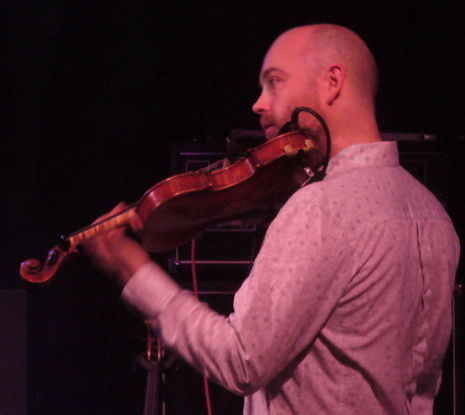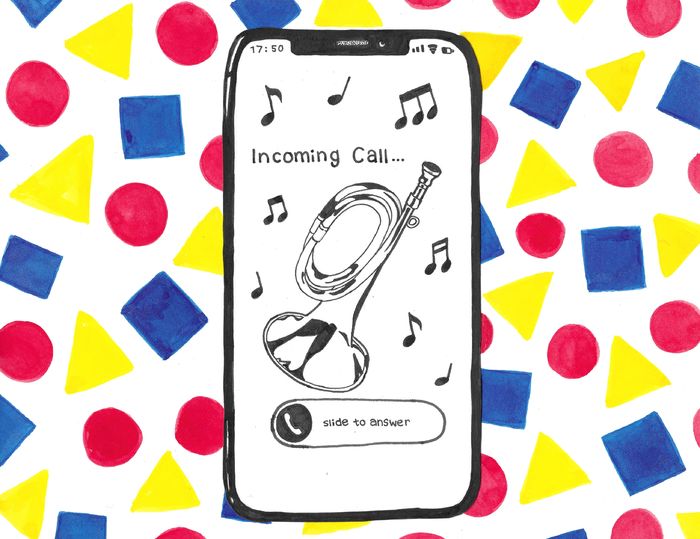In Conversation with Aidan O’Rourke
Nadya Miryanova and Nathaniel Warren interview the acclaimed Scottish folk musician and composer

Aidan O’Rourke – Scottish folk musician, fiddle player and composer – is a force to be reckoned with. Named the 2014 BBC Radio 2 Folk Awards Musician of the Year and winning the Scots Trad Music Awards Composer of the Year in 2011, he is a well-established figure within contemporary Folk music; he continues to stun the world with his original creations. Back in December, Varsity Music sat down to talk to him about all things folk, performing, and adapting to unforeseen circumstances.
Tell us about your musical journey – how did you first get into folk music?
“I grew up in a musical household. My Dad is an avid lover of folk music – an amateur player of guitars and fiddles. I felt surrounded by folk music – predominantly Irish folk music – my Dad’s Grandmother is Irish and my mother is Irish. I was brought up on the West coast of Scotland, in a little town called Oban. There was a fiddle teacher, who lived a couple of streets along from us. At age eight, I immediately struck up a really creative relationship with him. He was an old man at that stage – but he exuded musical enthusiasm and his love of Scottish music. So really, I was exposed to Scottish and Irish music from day one and there was no looking back. As there were instruments already around in the house before I had lessons, music-making felt like part of the daily routine, which I think is something really important. Those families that can make music making as normal as meal time have got the right idea – it feels really natural. Immersion in music from day one – it’s just like anything – if you’re surrounded by books or languages, you tend to take to these things quicker.”
What have been some of your best performance experiences?
“I remember looking out onto this sea of tens of thousands of people and thinking ‘gosh this is one way of living’.”
“I’ve been performing professionally since I was 14, so I’ve had so many – my first trip to America was when I was 15 with a band. I’d never even crossed the border to England before (I’d been to Ireland to visit relatives). I was on the overnight bus from Perth to London as an unaccompanied minor and the next thing I knew, I was in New York, after being in Oban a day and a half before. I’d never really been on the big stage before, other than little ceilidhs and folk clubs. I was trying to take in all this as a wide-eyed 15 year old. In one Stanford Connecticut concert, it was the city’s 250th anniversary since Stanford had been established. I remember looking out onto this sea of tens of thousands of people and thinking ‘gosh this is one way of living’.
“I did a lot of gigs in Japan and some of them have been the most memorable, but not because of the size. On our first trip, we did the same little club in Tokyo to the same 50 people every day of the week at 6pm. These were some of the most intimate and amazing performances because the audiences were just listening in a certain way. The thing that I’ve been missing the most is the social experience of the performance – experiencing music with others. In Japan it was such a focused listening and intimate experience, that it made us play completely differently.”
“It has been interesting not performing over the last ten months because of lockdown. I did three little concerts live in my courtyard in Edinburgh in between lockdown – at the end of August – outdoor, socially distanced concerts and that was my only live performance since the first lockdown. I’ve done various online things and films. I think I’ll come back to it as a completely different performer, because what I’ve missed has been the connection. It’s not the adoration or the applause. It’s the connection between other musicians in the moment and in particular, the audience in the moment.”
What were the highlights of the recording experience during lockdown?
“I was lucky enough to do the music for a film. I recorded the music just before lockdown – we lost the last two studio days, but I’d recorded a lot of music in the week before. Then, I had all this time to live with it, edit it and work with the filmmakers remotely. That was a really joyous and vast project to focus on for six months. Had I not had the time afforded by the restrictions, I wouldn’t have been able to devote so much time and energy to it. So I think we’ve made a really beautiful film.
I made this fillum in the eerie vaults in the Old Town. A boozy but enlightened tryst where Burns, Fergusson, Watt, Franklin, Hume + Smith all spent time. I gathered @RachelSermanni, @rickyaross, Allan MacDonald, @KathleenJamie + @AidanJohnMoffat to reawaken those Daft-Days. https://t.co/Jl5HosrsTK
- Aidan O'Rourke (@obanfiddle) January 21, 2021
“Throughout lockdown I did a series of little concerts in August to mark the last weekend of the non-existent Edinburgh Fringe. The community of neighbours that I got to know through lockdown because of my lifestyle (no routine and continuing off the road) was really special – I never managed to build up that kind of rapport because my life seemed so frenetic. We met each day at noon throughout the initial lockdown at the communal lawn. One of the neighbours would play music from his window and we’d have a dance for ten minutes and then all go back inside. I would occasionally do a little recital. In fact, I started a duet with my neighbour, who is an amateur bassoon player. It was really good fun.
“Through all this, I’ve started to notice how important the small things are, the small gatherings and interactions. Everyone is zooming in on what’s around them – it doesn’t have to be a big concert or festival. These moments were really poignant. I think I’ll come out of this feeling differently about outreach – engaging with local music making is important. It’s related to my environmental reasons for not wanting to fly too much. Musicians have realised that it is not necessary to fly to London every weekend.”
Tell me about the final instalment of your 30 album project: ‘The best of 365’
“I wasn’t in a band room with my band arranging and looking at ideas. It was just me and my fiddle.”
“It has been an epic project. Four years ago, I decided to write a tune each day for a year in response to these fantastic short stories by James Robertson. They were written with no endgame or plan for where it would end up. It turned into quite a personal project’. In the first few days, Aidan only told his partner and a small circle of friends. ’It wasn’t to be an epic public journey. It was a personal exercise of writing and playing. I was able to collaborate with a few new musicians that I hadn’t previously worked with, like Kit Downes – we expressed a love of each other’s music and he asked whether I had any material that we could work on, and I remarked on the 147 tunes that I’ve been working on – ‘music that has never been presented to the world’.
“We decided to record them all alongside audiobook versions of the stories as well. That all went up on the website – a new one for each day for a year. My record company got on board and loved the project so much that they wanted to release an album every other week. 30 albums, which I released digitally, and they’re all on Bandcamp. To celebrate the end, we had a physical double CD called ‘The best of 365’, which has just been released – that’s got Kit Downes, Sorren Maclean and Esther Swift. I stripped right back to the essence of what music making is, when I was writing, I didn’t have any collaborators to bounce the tunes off – I wasn’t in a band room with my band, arranging and looking at ideas. It was just me and my fiddle. I really got into the minutiae of my sound and the way that I express myself through it. When you do something like that everyday, you really hold a magnifying glass over yourself and the way that you practice. Your character traits and habits become magnified. I was really at risk of repeating myself here – I had to think about ways of expanding my palate to make an interesting project over a whole year.
“Prior to this project, I had been listening to a lot of jazz players, the likes of Bill Frizell and John Coltrane – their expression and freedom and ability to create interesting sounds between notes was really interesting. In this project, I was able to explore the hardcore traditional music that I love. I started listening to my former favourite players, like Kevin Burke and Paddy Glackin – Irish fiddlers, who recorded a lot of music with minimal backing. It took me back to my traditional roots, but also listening to Bach and thinking about counterpoint and harmony was important – using that subtly whilst accompanying myself.”
What are your plans for the future?
“I have just started my PhD, having applied before lockdown, and the experience has given me time to refine my title. I am continuing to produce more work, but now with a new perspective. My desire to fly around the world playing in concerts has changed. I think I’ll come out of this with a different vision of what a musician’s life can be. So much can be gained from focussing on your local area and community.”
 News / Eight Cambridge researchers awarded €17m in ERC research grants27 December 2025
News / Eight Cambridge researchers awarded €17m in ERC research grants27 December 2025 News / Downing investigates ‘mysterious’ underground burial vault 29 December 2025
News / Downing investigates ‘mysterious’ underground burial vault 29 December 2025 Lifestyle / Ask Auntie Alice29 December 2025
Lifestyle / Ask Auntie Alice29 December 2025 Sport / Hard work, heartbreak and hope: international gymnast Maddie Marshall’s journey 29 December 2025
Sport / Hard work, heartbreak and hope: international gymnast Maddie Marshall’s journey 29 December 2025 Interviews / Meet Juan Michel, Cambridge’s multilingual musician29 December 2025
Interviews / Meet Juan Michel, Cambridge’s multilingual musician29 December 2025










